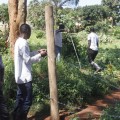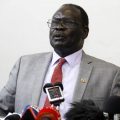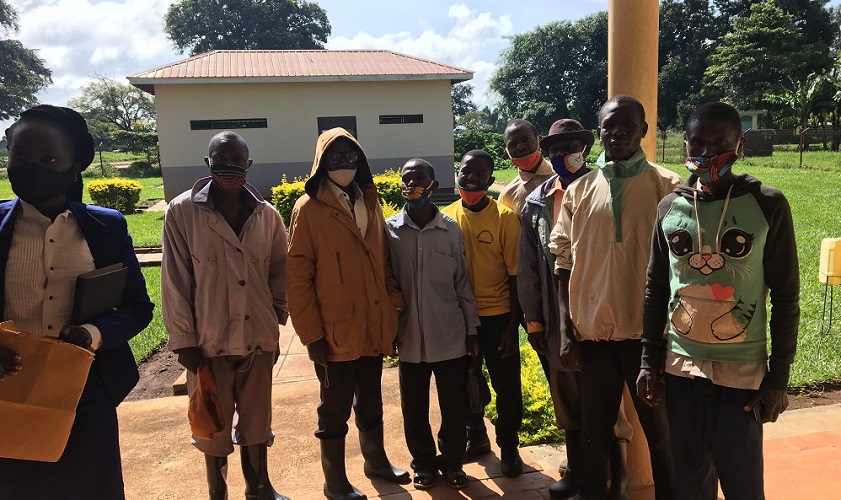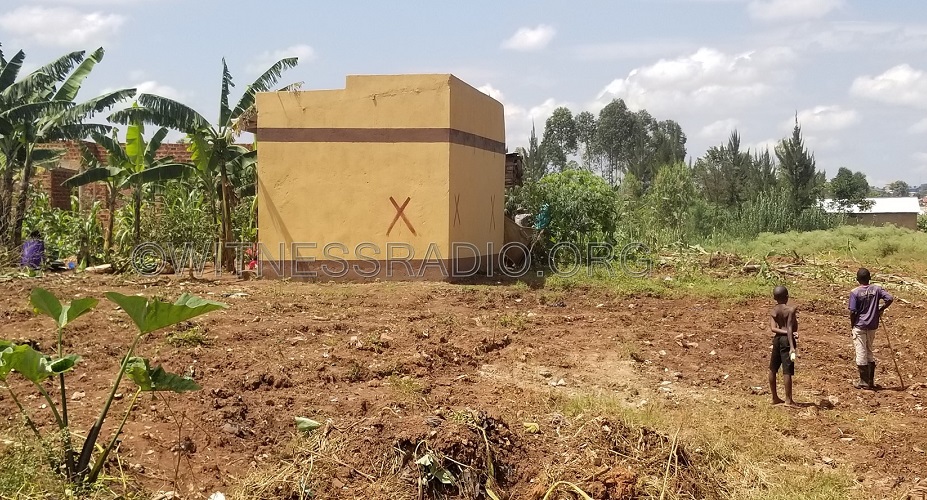WITNESS RADIO MILESTONES
My 26-year land fight with Gen Muhwezi
Published
7 years agoon

Last week, former minister Maj Gen Jim Muhwezi, unsuccessfully tried to stop court bailiffs from enforcing an eviction order given by Makindye magistrate Richard Mafabi.
This was the climax of a 26-year battle for land measuring 1.2 acres in Kyamula Zone, Salama in Makindye division of Kampala. The Observer talked to James Mubiru with whom Muhwezi has been feuding over the land.
GENESIS
Mubiru’s father, George Ssekajjugo, died in 1987 when he was three years old, leaving him and his sister Nabunjo Nammande under the care of their paternal uncle Nathan Ssewambwa.
Together with their mother, they left their home that sat on a 1.2 acre piece of land and joined the Ssewambwa homestead within the same locality.
However, they kept on using the land for farming until one day in 1992 when strangers claiming to have bought the land showed up at his uncle’s home to introduce themselves as the new landlords. Puzzled, Ssewambwa asked who had sold them the land seeing that the only two orphans; Mubiru and Nabunjo hadn’t come of age.
Ssewambwa decided to take the matter to the Local Council committee. He got little help. When Mubiru, the heir eventually became of age, he joined his uncle to pursue justice.
“After some time, the people who claim to have bought the land came and razed down my father’s house and also exhumed his remains,” Mubiru told The Observer.
A sympathetic member of the L-CII committee eventually introduced him to one William Hitimana who claimed he had bought the land from one Naome Batuusa. Mubiru says neither him nor his uncle knew anything about Batuusa who had claimed to be the caretaker of the orphans.
Hitimana told Mubiru that now that he had learnt that he had been swindled, he wanted to legally purchase the land after all.
“I asked him where he buried the remains of my father and he said he threw them in the lake because he didn’t want emizimu gy’Abaganda [Buganda’s spirits] to disturb him,” Mubiru says.
LETTERS OF ADMINISTRATION
Growing old and weak, Ssewambwa handed over all the paperwork relating to the land to Mubiru to start administering his father’s estate. With the assistance of LC-I chairman of Kyamula and his clan leaders who wrote to the administrator general, a letter of no-objection was obtained.
He was advised by the administrator general to get powers of attorney which were later given by then High court judge Remmy Kasule on July 12, 2005. Not much was heard of Hitimana until 2012 when Mubiru started the process of getting a lease from Buganda Land Board (BLB); the owners
of the land. In his first meeting, Hitimana had indicated a willingness to properly buy the land from Mubiru. But on discovering that he wasn’t willing to sell, he resorted to threats. Mubiru says Hitimana called someone whom he later learnt was Muhwezi.
“He asked Muhwezi what they should do for me, Muhwezi told him that he should just ignore me because I was useless,” Mubiru says.
He adds that Hitimana told him that it was in his interest to sell the land because if he doesn’t, he would lose it.
After the encounter, Mubiru still obtained an ownership certificate from BLB. He was given a go-ahead to survey the land so that they could determine how much money he would pay in busuulu [rental fees].
When the surveyors started surveying the land, Hitimana rose up again and through the LC-I chairman of Kyamula village, Kakooza Lukyamuzi, ordered the exercise stopped until the ownership wrangles are resolved.
The BLB’s standing orders prohibit surveying of any piece of land if there are some conflicts relating to owner- ship. When the exercise was stopped, Mubiru lodged a petition with High court at Nakawa and opened up a case against Hitimana.
The file was first transferred to the Anti-Corruption division then eventually forwarded to the Land division under High court judge, Joseph Murangira.
Muhwezi through his lawyer Ahmed Kalule Mukasa applied to become a party to the suit. He asked court for four months’ adjournment to justify why he was an interested party.
“But within those months, UPDF soldiers were deployed at our home and they arrested everybody they got there and took them to Kibuye police station,” Mubiru says.
Among the five arrested, three who were not related to Mubiru were released. Two were charged in the Makindye magistrate’s court with three counts of treason, attempted murder of Muhwezi and criminal trespass. Esther Nambayo, the then chief magistrate, remanded them to Luzira prison.
“I ran to the State House office in charge of land matters then led by Hajji Sseddunga who after studying the case wrote to the court telling them the circumstances surrounding their arrest. They were released on bail,” Mubiru says.
However, they continued to appear for mention of their case with the state attorney every time asking for an adjournment, claiming that investigations were incomplete. Nambayo eventually dismissed the case for lack of interest on the government side.
The five UPDF soldiers who had been deployed on the land never left until late 2013 when State House ordered them withdrawn. A two-roomed house was also erected on the land to house the soldiers. In place of the soldiers, private security guards were deployed.
In the court, after dismissing the case, the magistrate advised Mubiru and his cousins to streamline the ownership of the land.
Mubiru again sued Hitimana for malicious damage to property and trespass. Like in the previous cases, Hitimana refused to honour the summons, prompting court now under Richard Mafabi on March 30, 2015 to give its judgement, reinstating Mubiru as the rightful owner, and also awarding him Shs 10 million in damages.
Seeing that court had confirmed Mubiru as the owner, BLB gave him the green light to survey the land and get a lease title. Indeed, on June 6, 2015, Mubiru paid Shs 30 million to BLB for the land. But Muhwezi’s lawyer opposed the execution of the court order citing the presence of similar case in the High court.
Mubiru says he applied to that court to withdraw the case. He then went back to the magistrate’s court for fresh eviction orders which were granted and effected last week.
FRESH SURVEYING
In 2015, BLB gave him surveyors to survey the land but their attempts were foiled by the private security guards. In the scuffle that ensued, involving shooting, the surveyors were arrested and taken to Kibuye police.
To secure their release, Mubiru was called to police. Three accounts; attempted murder of Muhwezi, criminal trespass and treason were slapped against him. Mubiru says for seven days he was locked up in a toilet.
“One night I was picked and taken to the OC’s office where I found a man in civilian clothes who asked me why I was refusing to vacate the land. The man asked me whether I knew him and I told him no. He then told me I will die because of that land; that I didn’t know the people I was fighting with,’ Mubiru remembers.
He says that night he was badly tortured and two of his teeth extracted using pliers. He now uses artificial dentures. He was later released on police bond and told to report there every after five days; a thing he did until January 2016 when he got tired.
For now, Muhwezi has petitioned the High court’s land division, asking them to review the magistrate’s decision. “[But] I’m hopeful that I will prevail because this is my land,” Mubiru says.
GEN MUHWEZI LAWYER RESPONDS
Gen Jim Muhwezi’s lawyer, Ahmed Kalule, said Mubiru used an illegal court order to effect the eviction.
“Gen Muhwezi is trying to correct a situation where Mubiru in clear abuse of the court process; filed illegal suits and executed orders which court has made clear to him will never be executed until the High court is done with the case,” Kalule said last week.
He said Mubiru has been disturbing Muhwezi since 2012 despite knowing that the general bought the land in 2005.
“He [Mubiru] filed a suit against the former owner of the land William Hitimana even when he was aware that Gen Muhwezi was the new owner of this land,” Kalule says.
Having filed a suit in the High court, all subsequent suits were illegal for as long as the High court had not pronounced itself on the matter.
Source: The Observer
…
Related posts:

 ‘Injustice’ Inside Temple of Justice: A tale of a 96-year-old Woman Whom Court Ordered Off Land
‘Injustice’ Inside Temple of Justice: A tale of a 96-year-old Woman Whom Court Ordered Off Land
 Court orders are too weak to stop land evictions in Mubende?
Court orders are too weak to stop land evictions in Mubende?
 Probe tells Onek, former Tooro PM to end land fight
Probe tells Onek, former Tooro PM to end land fight
 Communities in Africa fight back against the land grab for palm oil
Communities in Africa fight back against the land grab for palm oil
You may like
-


A tree planting Chinese Company, Formosa Limited in fresh illegal land eviction…
-


Electricity Transmission Company holds titles in Masaka as residents point to foul play
-


The criminal trial of 8 land rights defenders is set to take off tomorrow
-


A long journey to freedom: Trial of 10 community members in Mityana flops
-


Tension as more than 300 poor families are being evicted by a World Bank-funded project…
-


Sad tales of how grabbers use foolery to grab community land
WITNESS RADIO MILESTONES
Top 10 agribusiness giants: corporate concentration in food & farming in 2025
Published
3 weeks agoon
June 19, 2025
Today a handful of agribusiness corporations have consolidated unprecedented control over the world’s food supply, with devastating consequences for farmers, consumers and the planet. A new report by ETC Group and GRAIN examines the state of corporate concentration in six sectors critical to agriculture: commercial seeds, pesticides, synthetic fertilisers, farm machinery, animal pharmaceuticals and livestock genetics.
Corporate consolidation is increasing in most of these sectors and four of them– seeds, pesticides, agricultural machinery and animal pharmaceuticals– now meet the definition of an oligopoly, in which four companies control more than 40% of a market. Concentration can be even higher at the national level, as is the case with synthetic fertilisers.
Top findings from the report include:
- Oligopolies dominate key sectors: Bayer, Corteva, Syngenta, and BASF control 56% of the global commercial seeds market, and 61% of the pesticides market.
- Profiteering amid global crises: Agribusiness giants have exploited crises like the Ukraine war and the COVID-19 pandemic to inflate prices. Fertiliser companies, for instance, saw revenues soar by 57% from 2020 to 2023, with some accused of price gouging.
- Digital and biotech expansion: Corporations are rapidly integrating AI, gene editing, and digital platforms into agriculture through partnerships with Big Tech companies. These technologies enable data extraction from farmers, facilitate carbon credit schemes, and tighter control over food systems—while raising concerns about biosafety, privacy, and corporate monopolies.
Source: grassrootsonline
Related posts:

 A corporate cartel fertilises food inflation
A corporate cartel fertilises food inflation
 Food inflation: The math doesn’t add up without factoring in corporate power
Food inflation: The math doesn’t add up without factoring in corporate power
 African governments are giving in to corporate pressure and undermining local seed systems – report
African governments are giving in to corporate pressure and undermining local seed systems – report
 The United Nations Food Systems Summit is a corporate food summit —not a “people’s” food summit
The United Nations Food Systems Summit is a corporate food summit —not a “people’s” food summit
WITNESS RADIO MILESTONES
Land grabbers evict 360,000 Ugandans in 2024
Published
8 months agoon
November 20, 2024
A staggering 363,021 Ugandans were displaced due to forced land evictions between January and June 2024, according to a new report by Witness Radio Uganda.
The report documented 90 cases of land evictions during this period, with nearly four incidents occurring weekly, affecting over 15,126 people and threatening 5,060 hectares of land nationwide.
The Central region was the epicenter, recording 52 eviction cases, followed by 24 in the Western region, eight in the Northern region, and six in the Eastern region. Alarmingly, the report estimated that 2,160 Ugandans face eviction daily, with 723 hectares of land at risk of being grabbed every day.
VIOLENCE AND HUMAN RIGHTS VIOLATIONS
Despite government promises and directives from President Museveni to halt evictions, land grabbers have routinely ignored these orders, often resorting to violence. Armed security forces, private militias, and police were reported to have carried out the majority of the evictions.
Of the reported cases, 37 were enforced by armed gangs on behalf of evictors, 25 involved Uganda Police, five were carried out with the participation of UPDF soldiers, and four were linked to private security companies.
“The egregious levels of impunity exhibited by land grabbers have left communities defenseless, creating an environment where their human rights are trampled without consequence,” said Jeff Wokulira Ssebaggala, country director of Witness Radio Uganda.
He called for accountability and justice, warning that the unchecked power of influential individuals and entities leaves marginalized communities vulnerable and without recourse.
DRIVERS OF EVICTIONS: INDUSTRIALIZATION AND LAND-BASED INVESTMENTS
The report identified the government’s push for industrialization and land-based investments as the primary drivers of forced evictions. Land is increasingly targeted for oil and gas extraction, mining, agribusiness and tree plantations for carbon offsets. While some of this land is already under development, other parcels remain vacant but are guarded by military personnel and private security firms.
Ssebaggala emphasized that industrialization must balance economic development with the protection of smallholder farmers’ rights to land and food security.

TRAGIC STORIES
The report highlighted harrowing cases that underscore the human toll of forced evictions. In Nakasongola, smallholder farmer Dan Ssebyala was ambushed and killed by armed men following a confrontation over disputed land. The district has become a hotspot for violent evictions involving absentee landlords and powerful investors.
Ismael Bwowe, a disabled father of 20, recounted how his land was confiscated after he demanded fair compensation. He faced intimidation, arrests and false charges from state authorities, including being accused of robbing an influential individual. Bwowe claimed that Total Energies offered legal support and representation on the condition that he accept their compensation terms.
“I refused,” he said, adding that the pressure to relinquish his land remains intense. The report underscores the urgent need for reforms to address forced evictions, ensure accountability, and protect the rights of vulnerable communities. Without meaningful intervention, Uganda risks deepening inequality and undermining the livelihoods of smallholder farmers who are essential to the country’s food security.
FAMILY JAILED AMID LAND DISPUTE
The plight of Richard Ssebagala, his wife Prossy Namande, and their relative Anania Ngabirano, residents of Kabubu-Kabongo village in Nansana Municipality, Wakiso district, highlights the human toll of Uganda’s ongoing land disputes. The family spent nine months in prison following their arrest on January 10, 2024, under controversial circumstances.
ARREST AND ALLEGATIONS
The arrests occurred at 1am, during a raid by officers from Luweero police station. Police reportedly banged on the doors and forcefully detained the family, accusing them of aggravated robbery. However, the family believes the arrest was a tactic linked to a land dispute with Benon Ntambi, a man who allegedly grabbed their land.
Before the arrests, Ntambi had reportedly destroyed crops, including tomatoes, potatoes, and bananas, on the contested land. While the family was incarcerated, a new building was constructed on their land, which is now occupied, raising further questions about the motivations behind their detention.
CALLS FOR JUSTICE
The case has drawn attention from Witness Radio Uganda, which has urged the government to take immediate action to address land grabbing and illegal evictions. The organization emphasized the need to strengthen land laws and protect vulnerable communities from abuses.
It also called for greater accountability in institutions such as the Uganda Police Force, the army and land registries, which are often accused of corruption and favoritism toward the wealthy.
“The government must prioritize justice for victims of illegal evictions and address systemic corruption that leaves the poor defenseless against land grabbers,” Witness Radio Uganda stated.
BROADER CONTEXT
This case underscores the broader issue of land conflicts in Uganda, where vulnerable families are often caught in disputes with powerful individuals or entities. Advocacy groups warn that the failure to address these issues not only erodes public trust but also perpetuates inequality and injustice.
As the government faces mounting pressure to act, the story of Ssebagala and his family serves as a stark reminder of the urgent need for reforms to protect land rights and ensure justice for those impacted by land disputes.
Source: The Observer
Related posts:

 Local land grabbers evict villagers at night; foreign investors cultivate the same lands the next day
Local land grabbers evict villagers at night; foreign investors cultivate the same lands the next day
 Uganda: Land-grab victim communities will join counterparts in commemorating the 2024 International Day of Struggle Against Industrial Plantations.
Uganda: Land-grab victim communities will join counterparts in commemorating the 2024 International Day of Struggle Against Industrial Plantations.
 Mubende Land Grab: Witnessradio.org presents another petition to Land Inquiry Commission, Wants All Titles being used to evict Natives to be Investigated
Mubende Land Grab: Witnessradio.org presents another petition to Land Inquiry Commission, Wants All Titles being used to evict Natives to be Investigated
 A Nullity? Ugandans Query Constitutional Land Amendment Bill
A Nullity? Ugandans Query Constitutional Land Amendment Bill
WITNESS RADIO MILESTONES
Uganda: Community members violently evicted by security forces, allegedly related to EACOP; incl. co. responses
Published
8 months agoon
November 18, 2024
On 10 February 2023, more than 2,500 community members were forcibly evicted from their land in Kapapi village in Hoima district in Western Uganda by security forces, receiving no compensation or resettlement.
Witness Radio, an Ugandan non-profit organisation comprised of human rights investigative journalists, lawyers, and social workers, said that many people were wounded during the eviction, women were raped, and houses were destroyed.
Witness Radio said its investigations found that this eviction occurred to clear the path for the Tilenga feeder pipeline, part of the East African Crude Oil Pipeline (EACOP). According to Witness Radio, in 2022 Kapapi community members’ land was surveyed for the Tilenga pipeline and people were informed they would be compensated for the land. Instead, they were forcibly evicted, which Witness Radio allege was backed and financed by Swacoff Intertrade Company Limited, known to TotalEnergies. They also allege that guards from private security company Magnum Security were involved. Witness Radio has also found that dozens of local farmers who were evicted have been arbitrarily arrested and face criminal charges.
The Business & Human Rights Resource Centre invited TotalEnergies, Swacoff Intertrade Company Limited, and Magnum Security to respond to the allegations. TotalEnergies responded and stated that no land eviction activities had been carried out by or on behalf of TotalEnergies EP Uganda (TEPU) and EACOP Ltd and that none of the affected people are Tilenga or EACOP Project Affected Persons. Swacoff responded and said that the company has never engaged in forceful eviction of any sort and asserts that these allegations are completely false. Their full responses and rejoinders from Witness Radio are available below. Magnum Security did not respond.
Related posts:

 Uganda: NGO claims Agilis Partners & Great Seasons violently evicted locals to pave the way for agribusiness; Agilis Partners responds
Uganda: NGO claims Agilis Partners & Great Seasons violently evicted locals to pave the way for agribusiness; Agilis Partners responds
 A son of the community defender is shot dead, another critically injured in a retaliatory attack by security guards evicting locals off their land to give way to large-scale sugarcane growing.
A son of the community defender is shot dead, another critically injured in a retaliatory attack by security guards evicting locals off their land to give way to large-scale sugarcane growing.
 Breaking: Criminal trial for seven community defenders opposed to EACOP/Tilenga project forced land eviction has been fixed.
Breaking: Criminal trial for seven community defenders opposed to EACOP/Tilenga project forced land eviction has been fixed.
 Uganda: CSOs claim Agilis Partners forcibly evicting local communities to pave way for agribusiness; company did not respond
Uganda: CSOs claim Agilis Partners forcibly evicting local communities to pave way for agribusiness; company did not respond

Seizing the Jubilee moment: Cancel the debt to unlock Africa’s clean energy future

Activism on Trial: Despite the increasing repressive measures, Uganda’s EACOP protesters are achieving unexpected victories in the country’s justice systems.

Communities Under Siege: New Report Reveals World Bank Failures in Safeguard Compliance and Human Rights Oversight in Tanzania

A decade of displacement: How Uganda’s Oil refinery victims are dying before realizing justice as EACOP secures financial backing to further significant environmental harm.

A decade of displacement: How Uganda’s Oil refinery victims are dying before realizing justice as EACOP secures financial backing to further significant environmental harm.

Govt launches Central Account for Busuulu to protect tenants from evictions

Activism on Trial: Despite the increasing repressive measures, Uganda’s EACOP protesters are achieving unexpected victories in the country’s justice systems.

Top 10 agribusiness giants: corporate concentration in food & farming in 2025

Innovative Finance from Canada projects positive impact on local communities.
Over 5000 Indigenous Communities evicted in Kiryandongo District
Petition To Land Inquiry Commission Over Human Rights In Kiryandongo District
Invisible victims of Uganda Land Grabs
Resource Center
- LAND GRABS AT GUNPOINT REPORT IN KIRYANDONGO DISTRICT
- RESEARCH BRIEF -TOURISM POTENTIAL OF GREATER MASAKA -MARCH 2025
- The Mouila Declaration of the Informal Alliance against the Expansion of Industrial Monocultures
- FORCED LAND EVICTIONS IN UGANDA TRENDS RIGHTS OF DEFENDERS IMPACT AND CALL FOR ACTION
- 12 KEY DEMANDS FROM CSOS TO WORLD LEADERS AT THE OPENING OF COP16 IN SAUDI ARABIA
- PRESENDIANTIAL DIRECTIVE BANNING ALL LAND EVICTIONS IN UGANDA
- FROM LAND GRABBERS TO CARBON COWBOYS A NEW SCRAMBLE FOR COMMUNITY LANDS TAKES OFF
- African Faith Leaders Demand Reparations From The Gates Foundation.
Legal Framework
READ BY CATEGORY
Newsletter
Trending
-

 SPECIAL REPORTS AND PROJECTS4 days ago
SPECIAL REPORTS AND PROJECTS4 days agoActivism on Trial: Despite the increasing repressive measures, Uganda’s EACOP protesters are achieving unexpected victories in the country’s justice systems.
-

 NGO WORK1 week ago
NGO WORK1 week agoCommunities Under Siege: New Report Reveals World Bank Failures in Safeguard Compliance and Human Rights Oversight in Tanzania
-

 SPECIAL REPORTS AND PROJECTS8 mins ago
SPECIAL REPORTS AND PROJECTS8 mins agoSeizing the Jubilee moment: Cancel the debt to unlock Africa’s clean energy future
